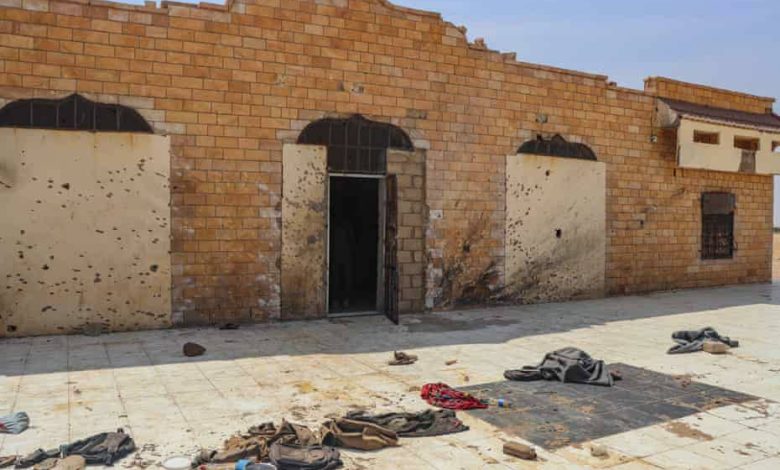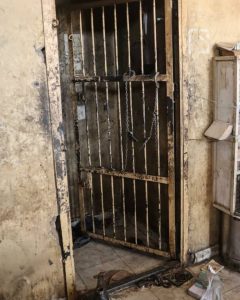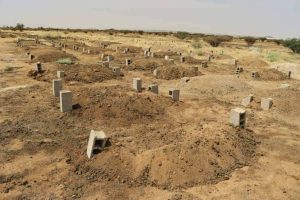Investigation Uncovers Detention Center and Mass Grave Outside Khartoum

Sudan Events – Agencies
Evidence reviewed by The Guardian suggests that over 500 people may have been tortured or starved to death and then buried in a secret mass grave north of Khartoum.
During a visit to a base previously controlled by the Rapid Support Forces (RSF) and recently reclaimed by the Sudanese army, an undisclosed detention center was discovered. Chains were found hanging from doors, rooms believed to be used for punishment were identified, and bloodstains were visible on the floor. Survivors rescued from the facility described repeated torture at the hands of their captors.
Near the base, a large burial site containing at least 550 unidentified graves was discovered, some freshly dug and others appearing to hold multiple bodies.
This site is the largest temporary grave discovered in Sudan during the civil war. If the reports are confirmed, it would mark one of the worst war crimes in the brutal conflict engulfing the country.
Survivors from the detention center, located in the southern part of the base about 70 kilometers north of Khartoum, said that many detainees died in the prison and are believed to have been buried nearby.
Medical examinations of the survivors revealed extensive signs of torture and confirmed that they had been subjected to starvation.
RSF Seizure of the Base and Satellite Evidence
The RSF seized the base near the village of Gari as a command and training center after fighting with the Sudanese army broke out nearly two years ago. Satellite images and military sources confirm that there were no graves at the site before the outbreak of war on April 15, 2023.
Satellite images show that the graves only appeared after the war began and the RSF occupied the base. An image taken weeks after the conflict erupted showed no signs of graves beside the base’s only road. However, another image taken nearly a year later, on May 25, 2024, showed numerous earthen mounds stretching across approximately 200 meters.

Survivors’ Testimonies
Dr. Hisham Al-Sheikh, who examined 135 men after the Sudanese army reclaimed the base in late January, said that all survivors showed clear signs of torture and severe malnutrition.
“When we reached them, they couldn’t even walk. We had to carry them out. There were obvious signs of torture on their bodies—some had been shot in the legs, while others had clean, straight scars from being beaten with sticks. All of them had been tortured,” Sheikh told The Guardian.
One survivor said he was repeatedly beaten by RSF guards, which forced him to remain curled up in a fetal position for long periods to protect himself:
“They would beat me morning and evening. They singled me out. I got used to sitting with my knees bent, and now I can’t straighten my legs to walk.”
Testimonies from Within the Base
Major Jalal Abkar of the Sudanese army, who served at the Gari base until the outbreak of the war in 2023, confirmed that there was no cemetery at the site at that time:
“I was there until Ramadan of that year (March 22 – April 20, 2023), and there was no cemetery.”
Sergeant Mohammed Amin, currently stationed at the base, said:
“All the bodies buried there died inside the base.”
Sheikh added that the survivors spoke of numerous other detainees dying from torture inside the facility.
Colonel Bashir Tamil, a senior officer in the Sudanese army, said:
“The detainees were found with their hands and feet tied. They were in extremely poor condition, showing signs of torture and various injuries.”
International Reactions and Calls for Investigation
Jean-Baptiste Gallopin, from the Crisis and Conflict Division at Human Rights Watch, said it was “essential” for the site to be treated as a war crime scene and for “immediate efforts to be made to preserve evidence that could be critical for accountability.”
So far, the site appears to have been preserved intact, with the Sudanese armed forces guarding it to prevent evidence tampering. International mass grave experts hope that independent analysts will be allowed access to the site.
War Crimes in Darfur and International Investigations
Darfur has long been the scene of the most notorious atrocities in the Sudanese conflict, with the RSF and allied Arab militias accused of committing acts of ethnic cleansing.
Earlier this year, the United States accused the RSF of committing genocide. The International Criminal Court (ICC) is currently investigating human rights violations in Darfur.
The evidence uncovered by The Guardian regarding crimes against humanity at the Gari base is being submitted to the ICC’s Office of the Prosecutor.
Mutual Accusations and Lack of Accountability
The RSF is not the only party accused of atrocities—Sudanese army leaders also face allegations of serious crimes against civilians, with some commanders under US sanctions.

A Sudanese military source believes that the RSF never expected the detention center and mass grave to be discovered, possibly assuming the site would remain hidden due to their extensive control over the region.
The RSF was contacted for comment on these allegations. In similar cases, the RSF typically refers to its code of conduct prohibiting the mistreatment of prisoners, claiming that it has an internal committee to prosecute those responsible for abuses.



